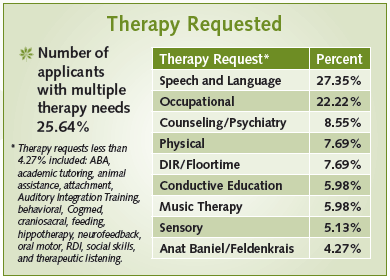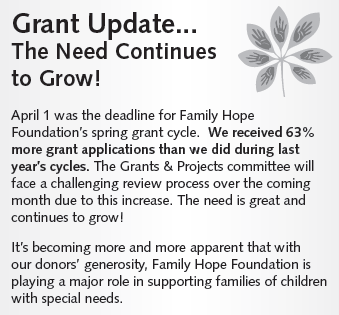Greetings, I am Jane Eppard, Vice-Chair of the Family Hope Foundation. We founded FHF in 2009 with a mission to invest in children with special needs through family support, engaging community experts, advocacy through collaboration, and financial assistance to provide access to therapies. In a very short amount of time we have gained community support and confidence and recently won Wood TV 8’s coveted Connecting with Community award. One reason for this rapid growth is due to our investment in evaluation from the very beginning.
Hot Tips:
- When in doubt, evaluate everything. When we first began our organization, we were not sure what we should evaluate. We decided to evaluate everything from process to programming. We evaluate processes and programs formatively and adjust where needed. We also evaluate summatively to determine the overall impact and the merit and worth of our programs.
- When in doubt, evaluation everyone. Often, organizations only evaluate consumer satisfaction. We decided to be effective, we needed to evaluate everyone. We have board members evaluate the strategic planning process, family members evaluate our scholarship application process, we interview community partners, and gather stories of the children we serve.
Lessons Learned:
- When you don’t have the expertise yourself, solicit board members. FHF started with a handful of passionate people determined to make an impact. We learned quickly that we needed more expertise in several areas. We were able to garner this expertise by soliciting board members with a diverse set of skills. The FHF board includes professionals with expertise in law, accounting, non-profit leadership, education, and yes, evaluation.
- Share the data, share the need. To justify funding needs, we shared census, educational, and even anecdotal data through our initial solicitations, website, newsletters, and annual reports. We also collected data on our scholarship applications and were able to make appeals based on the data from the applications. Often this type of data is not publicly accessible, for instance, the number of therapies children need that are not covered by insurance.
- Share the data, celebrate success! Since we gathered data on everything, we were able to show gains from our very first funding cycle. This quickly gave confidence to our donors and community members that we are indeed making an impact on children with special needs and their families.
- Qualitative data garners support. Donors love success stories. For our consumers, those successes are often not statistically significant or able to be measured quantitatively. I encourage you to gather evidence in the form of interviews, stories, photographs, and open-ended survey questions. The share qualitative results are often the reason we gain new supporters.
Resources:
Do you have questions, concerns, kudos, or content to extend this aea365 contribution? Please add them in the comments section for this post on the aea365 webpage so that we may enrich our community of practice. Would you like to submit an aea365 Tip? Please send a note of interest to aea365@eval.org. aea365 is sponsored by the American Evaluation Association and provides a Tip-a-Day by and for evaluators.



Jane, you provide a good summary of the importance and uses of internal evaluation. My most recent blog post is related. It’s about Samantha Yamada and her TEDx presentation on the importance of doing impact evaluation in nonprofits. See: http://stephenjgill.typepad.com/performance_improvement_b/2012/08/measure-impact-if-you-want-success.html
Jane,
As someone who has been witness to the amazing good the FHF has done in such a short amount of time, I want to congratulate the entire board for their focus, determination and dedication. Thanks for all you do.